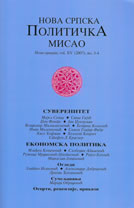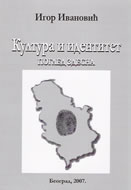| NSPM in English | |||
From Balkan Wars to Balkan Peace |
 |
 |
 |
| понедељак, 16. јануар 2012. | |
|
Respected Dean of the Diplomatic Corps, Excellencies, Ladies and Gentlemen, It is my distinct pleasure to welcome you to the fifth Ambassadors’ Conference of the Serbian Ministry of Foreign Affairs. Dear Paulo, thank you for honoring us with your presence, and for Portugal’s continuing support and encouragement for Serbia’s European process. I would also like to extend a warm welcome to the diplomatic corps. I look forward to engaging with you further in 2012, as we work to deepen our relationships around the globe on the basis of mutual interest and respect. To our country’s ambassadors, I extend a message of sincere appreciation. In no small part due to your diligence and hard work, we have succeeded in executing a principled and consistent foreign policy over the past four years, in accordance with the mandate entrusted to this Government by the citizens of the Republic of Serbia. I want to thank you for continuing to represent, protect, and promote our national interests under trying circumstances. Excellencies, We live in a period of unbridled change; it is practically impossible to predict what the world will look like, even in the not too distant future. In my view, this situation is in many ways reminiscent to the period of the French Revolution. As its influence spread across the Old Continent and beyond, its political and social manifestations became more varied. The only constant was that nothing remained the same once its influence reached a particular country, as nation after nation remonstrated for their particular social contract to be re-written. The geopolitical consequences for the international system were both unprecedented and wholly unforeseen. Reflecting back on that period, the political philosopher Alexis de Tocqueville wrote that “the continent’s chief rulers were prepared for everything except for what actually happened.” Similarly, the contemporary world seems beset by a series of ruptures whose ultimate outcomes cannot be plausibly conceptualized. “We meet here amidst upheavals of unprecedented scope”—these were the words used by Henry Kissinger at a conference in Germany a little over two months ago to describe the present tumults. This high level of geopolitical volatility will likely remain with us for quite some time, potentially propelling the international system into unexpected directions with an apparent spontaneity that could surprise just about everyone. Across-the-board repositioning seems to be taking pace, as norms shift, poles multiply, and rules get re-defined. As all this unfolds, the capacity of established clusters of influence to shape events in their favor will probably diminish. Excellencies, I believe that at least three distinct variables in the increasingly complex global equation require our heightened attention. The first is empowerment. Peoples are rising up against political and economic subjugation. Feelings of dispossession, nourished by instantaneous flows of information from across the world, have led to increased dissatisfaction about their own, local conditions. Without casting doubts on the ethical dimension of the struggle for democracy, it is clear that uncertainty in many corners of the planet will increase because of the movement for greater empowerment. Security will be further undermined by the reemergence of sectarian loyalties, and ethnic as well as tribal grievances—many of them long-suppressed. Such developments may have far-reaching implications quite beyond the affected areas, most notably the Middle East. The second variable in the new global equation takes as its starting point the legitimate calls for a redistribution of power and influence in the international arena. They are coming from multiple directions, regions, and formats. Brazil’s emergence, Russia’s renewal, India’s ascent, China’s rise, and South Africa’s confidence are amongst the main causes of this phenomenon, and so is the dynamism of a number of regional powerhouses—like Germany and Turkey. As their respective capabilities increase, they will be assuming a greater degree of influence over what is going on in the world around them. The historical record reminds us that great skill is required for major shifts in power relationships to take place without dangerous frictions. It is encouraging, however, that the more established actors—who are, after all, the architects, principal beneficiaries, and main defenders of the status quo—are tacitly acknowledging that changes will have to be made to the existing global governance rulebook. A harsher counter-reaction has perhaps been avoided due to the inescapable trend in global finance, which has seen traditional debtor and creditor countries engage in an unprecedented role reversal drama. As one of the world’s top diplomats has exclaimed, “you can’t get tough on your banker.” This brings me to the third critical variable in the complex global equation—what many people acknowledge as the most devastating economic calamity the world has known since the Depression of the 1930s. At first, the United States was its epicenter. Now it is the EU. For many months, the Union has struggled to cope with the euro sovereign debt issue—the most severe challenge ever to befall the European project, and one which is morphing into a profound crisis of governance. Its enormity and still unfolding consequences will inevitably impact the Balkans well into the future. We are already facing the fact that in many quarters of the Union, the enthusiasm for enlargement has waned. But this has not affected our Government’s strategic determination to firmly anchor Serbia in Europe. Meeting this critical goal is fundamentally about modernization and standards. It has also challenged us to keep raising the levels of efficiency, transparency and accountability—all of which are indispensable to the long-term prosperity of our nation. The process of reform will therefore continue apace. Its nuts and bolts are in the criteria set by the Copenhagen European Council in 1993, as well as regional cooperation conditions subsequently established by the Stabilization and Association framework about a decade later. Our Government will keep prioritizing their fulfillment—regardless of when the EU will achieve the necessary consensus on any of the formal steps in our integration process. Excellencies, Throughout the course of this Government’s four year term, we have worked tirelessly on the process of reconciliation in the Balkans. In addition to fully cooperating with the Hague Tribunal, Serbia has taken a number of bold steps, with President Tadic leading the way in working hard to close painful chapters in the recent history of the region. But for true reconciliation to take place, we must prevent legitimate pleas for justice from degenerating into an impulse for vengeance or attempts to assign collective guilt. Putting an end to enmity is the ultimate task of reconciliation. Yesterday’s tragedies must not be allowed to circumscribe anyone’s ability to reach out and work together for a better, more inclusive and tolerant tomorrow. In our view, this is the strongest foundation upon which to build a common future. For its part, Serbia will, in 2012, devote particular attention to ensuring the Western Balkans can prosper in peace and security. We are proud of the fact that in 2011, Belgrade has been a symbolic capital of regional cooperation. Last year, we successfully presided over the Central European Initiative, the Adriatic-Ionian Initiative, and the Migration Asylum and Refugees Regional Initiative. We currently chair the most important one—the Southeast European Cooperation Process—as well as the Organization of Black Sea Economic Cooperation. In a few months, the Second UN Alliance of Civilizations Forum for Southeast Europe will take place here, as well. With the support of other successor states to the Socialist Federative Republic of Yugoslavia, Serbia recently hosted the Fiftieth Anniversary Commemoration Ministerial Meeting of the First Summit of the Non-Aligned Movement, which took place in Belgrade in 1961. In total, one hundred and five high-level delegations participated in this grand event—shining a light on the fact that the NAM bequest remains a source of commonality for the former Yugoslav space. In a few weeks, we expect that a final decision will be reached on our candidacy to chair the OSCE in 2015, as part of an innovative package application with Switzerland. Being entrusted with such a responsibility—the product of a consensus by the 56 Participating States—will surely help to speed up the transformation of the Balkans into a dynamic area of convergence, a great European crossroads of cultures, traditions, ethnicities, and religions. Over the next twelve months, the unifying slogan for all our regional activities will be ‘From Balkan Wars to Balkan Peace’—a phrase that we hope will encapsulate what can be accomplished during the year that marks the one hundredth anniversary of the First Balkan War. We look forward to stand at the forefront of efforts to close the door for good on an era that ultimately delivered less than the promise it made to each of the nations that share our geography. Excellencies, For the Western Balkans to prosper in harmony, unresolved issues will need to be addressed in ways that do not undermine regional security. The central impediment to achieving this strategic imperative is the disagreement on the issue of Kosovo, and the failed attempt to resolve it by imposition, through UDI—the February 17th, 2008 Unilateral Declaration of Independence by the province’s ethnic-Albanian authorities. Before going any further, I would like to express a heartfelt acknowledgement of gratitude to the representatives of all the nations that have stood with us in solidarity on Kosovo. Thank you for continuing to honor Serbia’s territorial integrity in the face of ongoing pressures to endorse unilateralism. Despite all protestations to the contrary, doing so would directly contribute to the establishment of a deeply disturbing precedent, encouraging separatists anywhere in the world. Excellencies, The principled position of the Republic of Serbia will not change. Our constitutional imperative, as well as our moral, historical and—above all—democratic duty, compels us not to waiver from the fundamental commitment to a negotiated, comprehensive settlement for Kosovo, in accordance with the parameters set forth in UN Security Council resolution 1244 (1999). No stopping point short of agreement will ever truly solve the problem. The attempt to unilaterally secede has not fulfilled its promise, having kept the territory in a state of limbo. This is in no one’s interest, least of all ours. The accruing costs to the consolidation of regional stability cannot be ignored indefinitely. What we seek is a result all parties can embrace. This is the only way to produce a sustainable and lasting peace between Serbs and Albanians. President Tadic has repeatedly pointed out that it must include ironclad, internationally-guaranteed assurances that safeguard our state’s basic interests inside the province, by securing a viable solution for North Kosovo, protecting Serbian enclaves in South Kosovo, preserving Serbian identity and religious heritage throughout the province, and settling private and commercial property claims. Our diplomatic efforts will also focus on maintaining a healthy international environment within which the technical dialogue between Belgrade and Pristina can continue. Serbia remains fully committed to the process, notwithstanding numerous demonstrations of bad faith, and unprovoked, unilateral acts intended to change realities on the ground. Excellencies, Another important Kosovo-related task for Serbian diplomacy in 2012 will be to foster international support for a genuinely impartial and transparent criminal investigation into allegations of harvesting and smuggling of human organs before, during and after the 1999 conflict. Only the UN Security Council can establish a universal mandate, and temporal as well as territorial jurisdiction, to carry out an investigation that would be comprehensive in scope—as it has in all previous instances involving serious war crimes in the Balkans. We strongly believe that there is no legitimate reason whatsoever to depart from this established practice. Such investigations must be accountable to the whole world. It is the only way to guarantee fairness, while preventing doubts about anyone’s full commitment. Advocating an open-ended and secretive process with no obligation to report to the UN is outrageous and morally indefensible. Excellencies, The three variables in the new global equation—the quest for empowerment, shifting strategic relationships, and the impact of the great crisis—have changed a number of international economic parameters, including the fact that capital now flows less freely than it did in the past. Major economic decisions increasingly fall within the purview of States, narrowing the conceptual gap between geopolitics and geo-economics. One could even argue that they are on their way to being fully integrated with one another—fast becoming two sides of the same coin. For the prosperity to take hold and our reforms to stay on course, it is critical to find a way to attract additional investments from abroad and open new markets for our products. Yet this has become a much more complicated and delicate task. As the new global parameters start to sink in, we will also need to take into the account the fact that there has been a reduction of the capacity of traditional investors in this part of the world. However, as a consequence of the global outreach efforts we began more than four years ago, our diplomacy now finds itself able to more effectively leverage a number of historical friendships into economic opportunities. For instance, growing markets in a number of Non-Aligned countries have been re-opened to us. Our diplomacy has also been instrumental in getting countries like China or Azerbaijan to express a strong interest in deepening economic cooperation. Serbia’s comparative advantage includes not only our unhindered access to the EU common market, but also our unique network of free trade agreements with the Western Balkans, Kazakhstan, Russia and Turkey. Excellencies, At the beginning of its mandate, this Government articulated four diplomatic priorities—namely, our European process, regional harmony, a just and sustainable solution for Kosovo, and deepening economic cooperation with the world. Throughout our term in office, we conducted a principled and consistent foreign policy on that basis—under exceptionally difficult circumstances. It has now become evident that consensus on our four strategic priorities has been established amongst Serbia’s relevant political actors. To keep going forward as a nation, I believe it is fundamentally important to continue to pursue each one of the four in a complementary and holistic manner—and to not sacrifice any one of them on the altar of furthering another. They are all integral parts of a single whole, and will carry on mutually reinforcing each other well into the future. We shall remain true to the path we have chosen, for “we have faith in the righteousness of our cause”—as one of the greatest men of the 20th century, Mahatma Gandhi, said at a particularly trying time for his people. Whatever obstacles we may encounter, let us be strengthened by the knowledge that our nation has gone through hardships before. And let us guard against the cynical, fearful, or doubtful. A failure to do so would be tantamount to relinquishing our control over our future. Time and again, we have reached out for the arc of destiny and flexed it towards the promise of a brighter tomorrow. Let us do so once again, firmly and without wavering. Thank you for your attention. |
Од истог аутора
- Из архиве - Remarks Before the Foreign Affairs Committee of the European Parliament
- Serbia is dedicated to solving all differences at the negotiating table
- Our Kosovo policy will not change
- 2009 was Serbia’s best EU accession year ever
- We will never recognize UDI
- Kosovo is without a doubt the darkest corner of Europe
- Serbia, the United States, and the Riddle of Europe
- Serbia will be a bridge between the European Union and the African Union
- Kosovo is our Jerusalem
- Minister of Foreign Affairs Vuk Jeremic’s Speech at the UN SC
- Address Before the Second Serbian Ambassadors’ Conference
- One Nation, Indivisible
Остали чланци у рубрици
- Playing With Fire in Ukraine
- Kosovo as a res extra commercium and the alchemy of colonization
- The Balkans XX years after NATO aggression: the case of the Republic of Srpska – past, present and future
- Из архиве - Remarks Before the Foreign Affairs Committee of the European Parliament
- Dysfunction in the Balkans - Can the Post-Yugoslav Settlement Survive?
- Serbia’s latest would-be savior is a modernizer, a strongman - or both
- Why the Ukraine Crisis Is the West’s Fault
- The Ghosts of World War I Circle over Ukraine
- Nato's action plan in Ukraine is right out of Dr Strangelove
- Why Yanukovych Said No to Europe

.jpg)








.jpg) Dear Foreign Minister Portas,
Dear Foreign Minister Portas,













